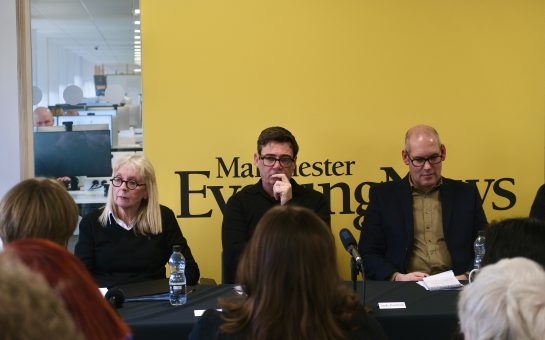There will be an ‘exodus of doctors’ from the NHS, if proposed changes to doctors contracts go ahead, a junior doctor in Manchester has said.
Hundreds of protesters gathered in St. Peter’s Square from 5:30pm, claiming the changes could mean increased working hours for junior doctors, and that this could strain the NHS, leading to over-worked staff and ‘compromise patient safety’.
The protest comes after the British Medical Association’s Junior Doctors Committee decided against re-entering negotiations over a new contract, with junior doctors set to be balloted on whether to strike action against the proposed contract.
Speaking to MM, Dr Aaron Borbora, an NHS Radiology Registrar and junior doctor, said that if introduced, the proposed contract risked ‘destabilising’ the NHS.
“We’re all protesting here today because we’re not only angry, we’re worried,” he said.
“We’re worried about the effect of this contract on our patients, on ourselves and on our health service.
“This contract imposition – which has been without negotiations – threatens to destabilise the health service and return doctors to working long and dangerous hours, something proven to have a detrimental effect on patient’s safety.”
Renegotiation of junior doctors’ contracts began in 2012, with the Department for Heath saying the terms and conditions of employment needed to be ‘modernised.’
But negotiations between the BMA and government broke down in October 2014, with the BMA deciding against re-entering contract negotiations last month, calling government proposals ‘unacceptable.’
Speaking at the protest Emma Ruskin, a third year medical student, called for junior doctors and student medics to ‘join the BMA’ if they were not currently a member.
“What I’m most concerned is the attacks on part-time workers,” she said.
“I’m a medical student and when I graduate I’ll have £84,000 of debt.
“The attacks that are happening in this contract are on less than full-time employees, predominantly women with children, who take part-time training mean they are going to experience severe pay cuts.
“And I’m unsure now, with that level of debt and with the pay cuts, whether I’ll be able to take time out to have children and to spend time with my family.”
Medical staff and students were joined at the protest by anti-austerity activists and members of The People’s Assembly, with the crowd chanting against Tory cuts and the privatisation of the NHS.
Dr Leanne Darwin, an Anaesthetic Registrar, claimed the new contracts where the ‘first step in the dismantling of the NHS’.
“There has already been a motion passed in the House of Lords in the last few weeks to investigate alternative funding for health care, including an insurance based system,” she said.
“So lots of us are concerned this is the beginning of the breakdown on the NHS.
“It’s our NHS, it’s our patients NHS.
“This is all about patient safety and the health service as it stands.”
But in statements released over the past week the Department of Health said it wanted to make changes to doctors’ contracts to ‘improve patient safety in hospitals’ and called for the BMA junior doctors committee to return to the negotiation table.
The statement read: “We believe the current contract is unfair for doctors and patients, so we want to discuss a way forward with the BMA that maintains average earnings for junior doctors and doesn’t cut the pay bill.
“We really value the work and commitment of junior doctors, but their current contract is outdated and unfair – the best way of changing that is negotiation.”



